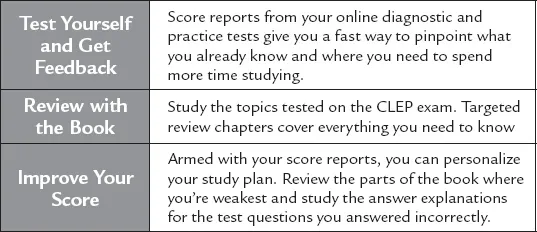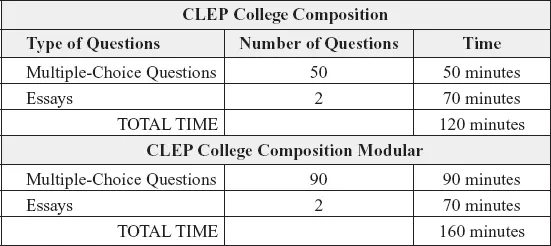![]()
Part I
INTRODUCTION
![]()
Introduction
Passing the CLEP College Composition Exams
Congratulations! You’re joining the millions of people who have discovered the value and educational advantage offered by the College Board’s College-Level Examination Program, or CLEP. This test prep covers everything you need to know about the CLEP College Composition exams, and will help you earn the college credit you deserve while reducing your tuition costs.
GETTING STARTED
There are many different ways to prepare for a CLEP exam. What’s best for you depends on how much time you have to study and how comfortable you are with the subject matter. To score your highest, you need a system that can be customized to fit you: your schedule, your learning style, and your current level of knowledge.
This book, and the online tools in the CLEP package, allow you to create a personalized study plan through three simple steps: assessment of your knowledge, targeted review of exam content, and reinforcement in the areas where you need the most help.
Let’s get started and see how this system works.
$1.99 unlocks the CLEP online tools at www.rea.com/studycenter
THE REA STUDY CENTER
The best way to personalize your study plan and focus on your weaknesses is to get feedback on what you know and what you don’t know. At the online REA Study Center, you can access two types of assessment: a diagnostic exam and full-length practice exams. Each of these tools provides true-to-format questions and delivers a detailed score report that follows the topics set by the College Board.
Diagnostic Exam
Before you begin your review with the book, take the online diagnostic exam. Use your score report to help evaluate your overall understanding of the subject, so you can focus your study on the topics where you need the most review.
Full-Length Practice Exams
These practice tests give you the most complete picture of your strengths and weaknesses. After you’ve finished reviewing with the book, test what you’ve learned by taking the first of the two online practice exams. Review your score report, then go back and study any topics you missed. Take the second practice test to ensure you have mastered the material and are ready for test day.
If you’re studying and don’t have Internet access, you can take the printed tests in the book. These are the same practice tests offered at the REA Study Center, but without the added benefits of timed testing conditions and diagnostic score reports. Because the actual exam is internet-based, we recommend you take at least one practice test online to simulate test-day conditions.
AN OVERVIEW OF THE EXAMS
The two CLEP College Composition examinations are designed to measure your writing skills that are taught in most first-year college composition courses. They consist of Conventions of Standard Written English, Revision Skills, Ability to Use Source Materials, and Rhetorical Analysis. In addition there are two essays on the College Composition and one or two on the College Composition Modular. (The number of essay questions in this test is determined by the institution.) Following is a breakdown of each test:
Each of these tests may contain additional multiple-choice questions that will not be counted toward your scores.
Within the multiple-choice section of each exam, the topics are broken down by the following percentages:
Conventions of Standard Written English: 10%
• Syntax (parallelism, coordination, subordination)
• Sentence boundaries (comma splice, run-ons, sentence fragments)
• Recognition of correct sentences
• Concord/agreement (pronoun reference, case shift, and number; subject-verb; verb tense)
• Diction
• Modifiers
• Idiom
• Active/passive voice
• Lack of subject in modifying word group
• Logical comparison
• Logical agreement
• Punctuation
Revision Skills: 40%
• Organization
• Evaluation of evidence
• Awareness of audience, tone and purpose
• Level of detail
• Coherence between sentences and paragraphs
• Sentence variety and structure
• Main idea, thesis statements and topic sentences
• Rhetorical effects and emphasis
• Use of language
• Evaluation of author’s authority and appeal
• Evaluation of reasoning
• Consistency of point of view
• Transitions
• Sentence-level errors primarily relating to the conventions of standard written English
Ability to Use Source Materials: 25%
• Use of reference materials
• Evaluation of sources
• Integration of resource material
• Documentation of sources (including, but not limited to, MLA, APA and Chicago manuals of style)
$1.99 unlocks the CLEP online tools at www.rea.com/studycenter
Rhetorical Analysis: 25%
• Appeals
• Tone
• Organization/structure
• Rhetorical effects
• Use of language
• Evaluation of evidence
These percentages are the same regardless of which of the two tests you take. However, some of the topics within those sections may be different. We have indicated them within the review chapters.
College Composition Essays
The College Composition exam includes two essays testing your skills of argumentation, analysis and synthesis. The first essay is based on your reading, observation or experience, while the second requires you to synthesize and cite two provided sources.
College Composition Modular Essays
Based on each college’s own policy, you will take the direct writing assessment module. Options include:
• An essay section developed and provided by CLEP, assessing the same skills as the College Composition essay section, that requiring you to respond to two essay prompts.
• An essay section developed, administered and scored by the college.
• Another assessment or evaluation determined by the college.
ABOUT THE CLEP PROGRAM
What is the CLEP?
CLEP is the most widely accepted credit-by-examination program in North America. CLEP exams are available in 33 subjects and test the material commonly required in an introductory-level college course. Examinees can earn from three to twelve credits at more than 2,900 colleges and universities in the U.S. and Canada. For a complete list of the CLEP subject examinations offered, visit the College Board website: www.collegeboard.org/clep.
Who takes CLEP exams?
CLEP exams are typically taken by people who have acquired knowledge outside the classroom and who wish to bypass certain college courses and earn college credit. The CLEP program is designed to reward examinees for learning—no matter where or how that knowledge was acquired.
Although most CLEP examinees are adults returning to college, many graduating high school seniors, enrolled college students, military personnel, veterans, and intern...


